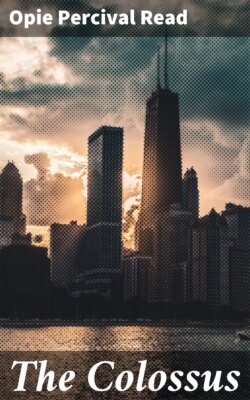Читать книгу The Colossus - Opie Percival Read - Страница 12
На сайте Литреса книга снята с продажи.
DISSECTING A MOTIVE.
ОглавлениеTable of Contents
Onward went the ship, nodding to the beck and call of mighty ocean. DeGolyer—or, rather, Henry Witherspoon, as now he knew himself—walked up and down the deck. And it seemed that at every turn his searching grief had found a new abiding-place for sorrow. His first strong attachment was broken, and he felt that in the years to come, no matter what fortune they might bring him, there could not grow a friendship large enough to fill the place made vacant by his present loss. An absorbing love might come, but love is by turns a sweet and anxious selfishness, while friendship is a broad-spread generosity. Suddenly he was struck by the serious meaning of his obligation, and with stern vivisection he laid bare the very nerves of his motive. At first he could find nothing save the discharge of a sacred duty; but what if this trust had entailed a life of toil and sacrifice? Would he have accepted it? In his agreement to this odd compact was there not an atom of self-interest? Over and over again he asked himself these questions, and he strove to answer them to the honor of his incentive, but he felt that in this strife there lay a prejudice, a hope that self might be cleared of all dishonor. But was there ever a man who, in the very finest detail, lived a life of perfect truth and freedom from all selfishness? If so, why should Providence have put him in a grasping world? Give conscience time and it will find an easy bed, and yet the softest bed may have grown hard ere morning comes.
"Who am I that I should carp with myself?" the traveler mused. "Have the world and its litter of pups done anything for me?" He walked up and down the deck. "God knows that I shall always love the memory of that dear boy. But if all things are foreseen and are still for the best, why should he have died? Was it to throw upon me this great opportunity? But who am I? And why should a special opportunity be wrought for me? But who is anybody?"
Going whither? Home. A father—and he thought of a drunken painter. A mother—and his mind flew back to a midnight when arms that had carried him warm with life were cold in death. A millionaire's son—that thought startled him. What were the peculiar duties of a millionaire's son? No matter. They might impose a strain, but they could never be so trying as constant poverty. But who had afflicted him with poverty? First his birth and then his temperament. But who gave him the temperament? He wheeled about and walked away as if he would be rid of an impertinent questioner.
When the ship reached New Orleans he went straightway to the telegraph office and sent this message to George Witherspoon: "Will leave for Chicago to-day."
And now his step was beyond recall; he must go forward. But conscience had no needles, and his mind was at rest. In expectancy there was a keen fascination. He met a reporter whom he knew, but there was no sign of recognition. A beard, thick, black and neatly trimmed, gave Henry's face an unfamiliar mold. But he felt a momentary fear, he realized that a possible danger thenceforth would lie in wait for him, and then came the easing assurance that his early life, his father and his mother, were remembered by no one of importance, and that even if he were recognized as Henry DeGolyer, he could still declare himself the stolen son of George Witherspoon. Indeed, with safety he could thus announce himself to the managing editor who had sent him to Costa Rica, and he thought of doing this, but no, his—his father wanted the secret kept until the time was ripe for its divulgence. He went into a restaurant, and for the first time in his life he felt himself free to order regardless of the prices on the bill of fare. Often, when a hungry boy, he had sold newspapers in that house, and enviously he had watched the man who seemed to care not for expenses. As he sat there waiting for his meal, a newsboy came in, and after selling him a paper, stood near the table.
"Sit down, little fellow, and have something to eat."
This was sarcasm, and the boy leered at him.
"Sit down, won't you?"
"What are you givin' me?"
"This," said Henry, and he handed him a dollar.
